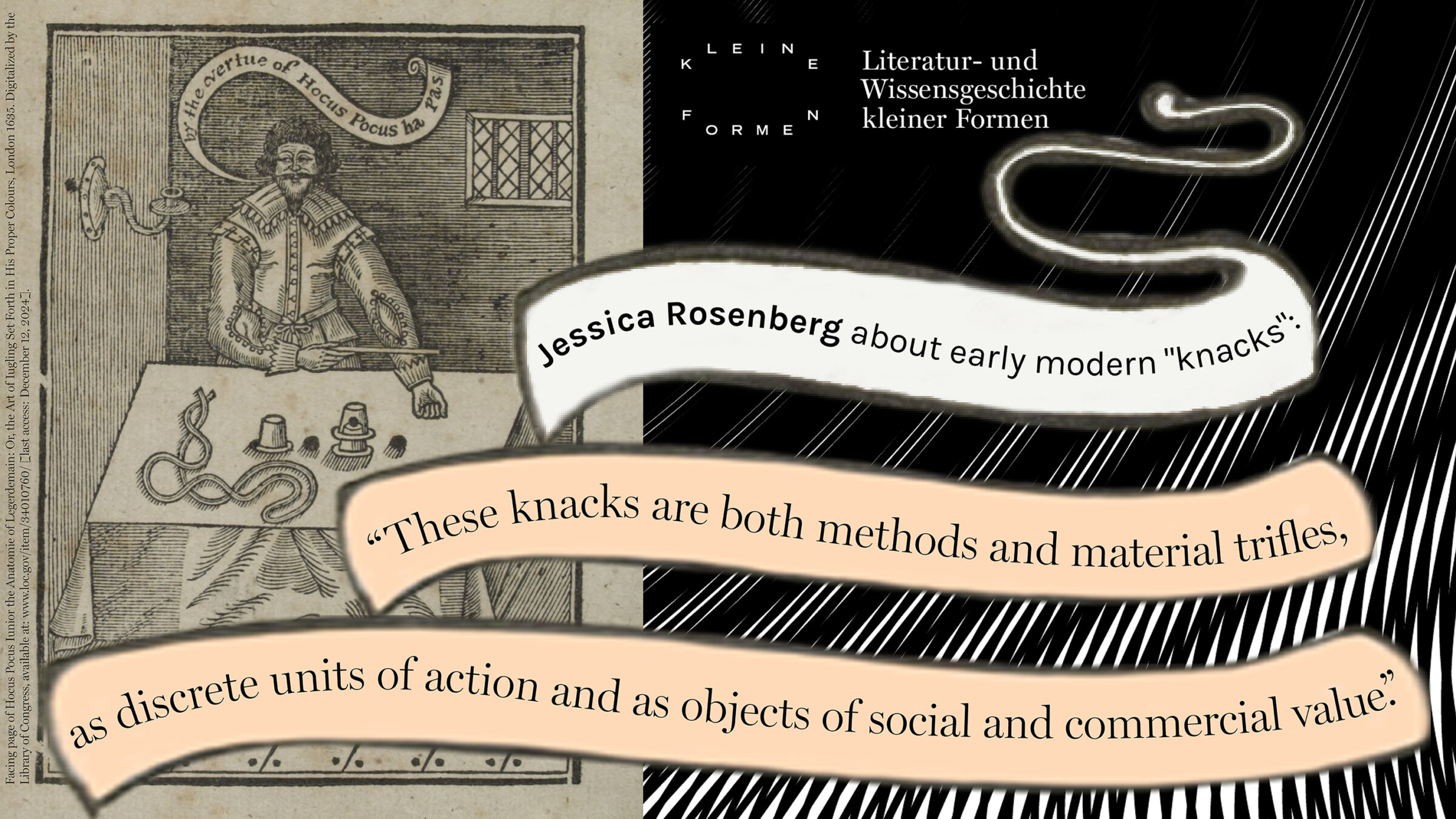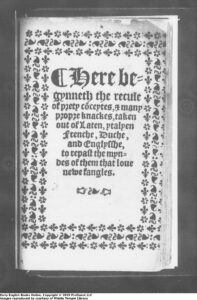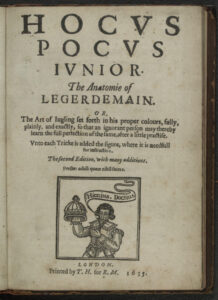“The Theory of the Knack”
In this episode
In the summer of 2024, literary scholar Jessica Rosenberg joined the “Kleine Formen” research group as a Mercator-Fellow. Early in her stay, she introduced her new research project titled Shakespeare’s Second Nature: Tricks, Knacks, and the Remaking of Renaissance Worlds. Her public lecture on “The Theory of the Knack” marked the start of an intense and continued exchange.
The microform team decided to capture this productive encounter—and take it even further: In collaboration with Jessica Rosenberg, it developed a double feature that opens in a seminar room and closes in the Botanical Garden. Its first part consists of a commented version of her introductory lecture. The recording allows to follow Rosenberg tracing the formation of the “knack” in the culture of early modern England. In her talk, she placed it in the context of other minor epistemic forms, like the trick, the recipe, and the device, as informal (and critically undervalued) units of knowledge. These small forms circulated in practical handbooks and on the public stage, where they gave shape both to emergent styles of theatrical comedy and to the rhythms of everyday life. On- and off-stage, as embodied skill and as material knick-knack, the knack suggests an iterative model of theatrical and epistemic value: it must be repeated to be useful, its variations eventually gathered into the more complex mechanisms of a comic plot or expert practice. Through examining the sixteenth-century emergence of the knack, Rosenberg finally asked whether it is possible to identify a low-brow, or pragmatic, theory of method in early modern English texts.
Jessica Rosenberg is an associate professor at Cornell University, researching early modern literature and culture, history of science, plant studies, and book history. In her first book on Botanical Poetics: Early Modern Plant Books and the Husbandry of Print she describes the reciprocal influence between plant forms and text forms in early modern print objects. This publication inspired the microform team to take its author on a trip to the Botanical Garden in Berlin. You can follow this excursion in the second part of the feature, which will be published next month.
Recommended citation:
“The Theory of the Knack”. A lecture by Jessica Rosenberg, in: microform. Der Podcast des Graduiertenkollegs Literatur- und Wissensgeschichte kleiner Formen, available at: www.kleine-formen.de/theory-of-the-knack, Berlin 2024 2025.
Research literature:
Burckhardt, Jacob: Die Kultur der Renaissance in Italien, Stuttgart 1860. [The Civilization of the Renaissance in Italy, translated by S. G. C. Middlemore, London 1878]
Ngai, Sianne: Theory of the Gimmick. Aesthetic Judgment and Capitalist Form, Cambridge, Mass. 2020.
Lopez, Jeremy: “Imagining the Actor’s Body on the Early Modern Stage”, in: Medieval & Renaissance Drama in England 20 (2007): 187–203.
Sources:
A Knack to Know A Knave, London 1594.
A Knack to Know an Honest Man, London 1596.
Anon., Here begynneth the recule of prety co[n]ceytes, &c. many propre knackes, taken out of Laten, ytalyen Frenche, Duche, and Englysshe, to repast the myndes of them that loue newe fangles, London [1545?].
B., M.: The Triall of True Friendship or Perfit Mirror, wherby to Discerne a Trustie Friend from a Flattering Parasite. Otherwise, A Knacke to Know a Knaue From an Honest Man: By a Perfit Mirrour of Both: Soothly to Say; Trie ere You Trust; Beleeue No Man Rashly. No Lesse Profitable in Obseruing, then Pleasant in Reading, London 1596.
Erasmus: In Praise of Folly, translated by Thomas Chaloner, London 1549.
Hegel, Georg Wilhelm Friedrich: Vorlesungen über die Ästhetik, Berlin (1835) 1986.
Hocus Pocus Iunior the Anatomie of Legerdemain: Or, the Art of Iugling Set Forth in His Proper Colours, London 1634.
Montaigne, Michel de: Of vaine subtilties, or subtill devises, in: Essayes of Morall, Politike, and Millitarie Discourses, translated by John Florio, London (1595) 1603.
Newton, Thomas: Epistle, in: Levinus Lemnius, Touchstone of Complexions, London 1576.
Scott, Reginald: Discoverie of Witchcraft, London 1584.
Shakespeare, William: A Midsummer Night´s Dream, London 1600.
Shakespeare, William: Love´s Labour´s Lost, London 1598.
Tusser, Thomas: Five Hundred Points of Good Husbandry, London 1573.
Whitney, Isabella: The Copy of a Letter, Lately Written in Meter by a Young Gentlewoman: to her Unconstant Lover, London 1567.
Images:
(1) Title page from Anon., Here begynneth the recule of prety co[n]ceytes, &c. many propre knackes, taken out of Laten, ytalyen Frenche, Duche, and Englysshe, to repast the myndes of them that loue newe fangles, London [1545?].
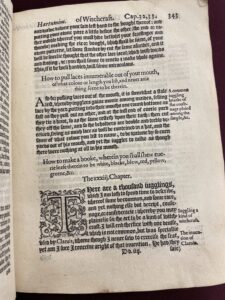
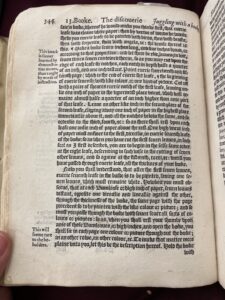
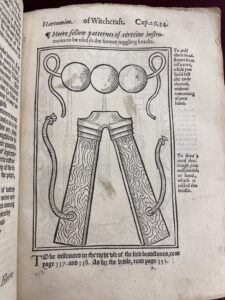
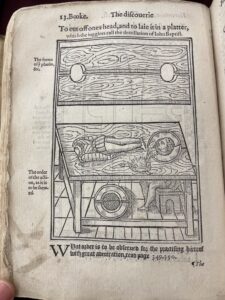
(2; 3; 4; 5) Four pages from Reginald Scott, Discoverie of Witchcraft, London, 1584. RB 69254. Henry E. Huntington Library and Gardens, San Marino, CA.
(6) Title page of Hocus Pocus Iunior the Anatomie of Legerdemain: Or, the Art of Iugling Set Forth in His Proper Colours, London 1635. Digitalized by the Library of Congress, available at: www.loc.gov/item/34010760/ [last access: December 12, 2024].
Credits
Speaker
Marvin Renfordt
Script
Marvin Renfordt and Marie van Bömmel
Editor
Marie van Bömmel and Johann Gartlinger
Mastering
Johann Gartlinger
Music
“Crumpet”, “Leptias” and “Beignet” by Blue Dot Sessions
Jingle
Michael Hoeldke (composition) and Cathrin Bonhoff (voice)


